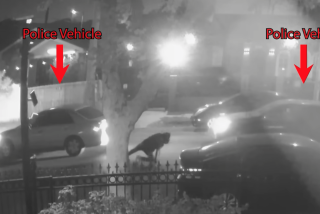Slow Road to Justice
- Share via
Why does it take so long to bring a criminal defendant to trial? That’s a question on many minds this week as the trials of two accused serial murderers finally open, after years of delay. In Los Angeles, the trial of drifter Richard Ramirez, the man charged with a string of sadistic night-time murders, will begin today, nearly three years after he was identified as the “night stalker” and apprehended. And, in Orange County, a jury already is being selected to hear the case against computer consultant Randy Kraft, who was arrested more than five years ago when California Highway Patrol officers pulled him over on the San Diego Freeway and found a young Marine dead in his car.
The Ramirez and Kraft cases are ofted cited as examples par excellence of a criminal judicial system that has so tied itself in knots that it can barely function. These delays can be frustrating, and yet as we looked for something or someone to account for them, no culprit came readily to view.
By their very nature, capital cases are prolonged. Where questions of life and death are concerned, every step of the process must be exacting, from arrest through sentencing, to ensure that no innocent person is put to death and that the convictions of the guilty will hold up on appeal. Multiple murders further complicate the process: Defense attorneys must investigate each charge, interview witnesses, undertake their own scientific tests and then defend against each separate count. Ramirez is charged with 13 murders and 30 other felonies, and Kraft is accused of drugging and killing 16 young men. Is it any wonder that the investigative stage lasted years?
Personalities also can play a role in delays. Ramirez retained two lawyers unfamiliar with capital cases, and their inexperience shows in the indiscriminate blizzard of pretrial motions that they filed and in their overt hostility to the prosecutor and the judge; yet Ramirez has a right to the lawyers of his choice. Superior Court Judge Michael A. Tynan is a former public defender who is sensitive to defendants’ rights, but he has prodded and pushed Ramirez’s lawyers toward an early trial--and had his impartiality challenged in turn. Without Tynan on the bench, it might have taken even longer to get this far. Orange County prosecutors have accused Kraft’s court-appointed, publicly paid defense team of dilatory tactics, a charge that the three lawyers dispute, and the judges in charge of the case have bent over backward to give the defense time to prepare; they didn’t want a misstep to derail the case later.
As long as the adversary system of justice exists, there is no simple way to shorten the process in cases like these. Mandating that a case be ready for trial 60 days after arraignment--the current, often-waived rule--may nudge along routine matters but isn’t going to speed up extraordinary cases. But California’s judicial system has one peculiar facet that prolongs all criminal trials, not just the celebrated ones--the preliminary hearing.
In 1978, in Hawkins vs. Superior Court, the California Supreme Court ruled that defendants have a constitutional right to a preliminary hearing to determine whether there is probable cause to bind them over for trial; an indictment by a grand jury does not suffice. So now the state tries many suspects twice--first at a preliminary hearing, where both sides call witnesses and the rules of evidence apply, and then at a formal trial. A prelim, as it’s known, can last longer than most trials; Ramirez’s lasted two months.
We have doubts that prelims have fulfilled their purpose, ensuring that defendants are not put through the rigors of a trial unnecessarily. A prelim can be every bit as devastating as a trial; just ask the defendants in the McMartin preschool case who weathered an 18-month prelim and then had the charges dismissed. Most other states and the federal system make do with indictments, without the same delays that California experiences. In recent months the state Supreme Court twice has passed up opportunities to reconsider Hawkins. But it seems to us that, as Californians ponder how to make “speedy trial” less of a bad joke, rethinking Hawkins might be a good place to start.
More to Read
Sign up for Essential California
The most important California stories and recommendations in your inbox every morning.
You may occasionally receive promotional content from the Los Angeles Times.










